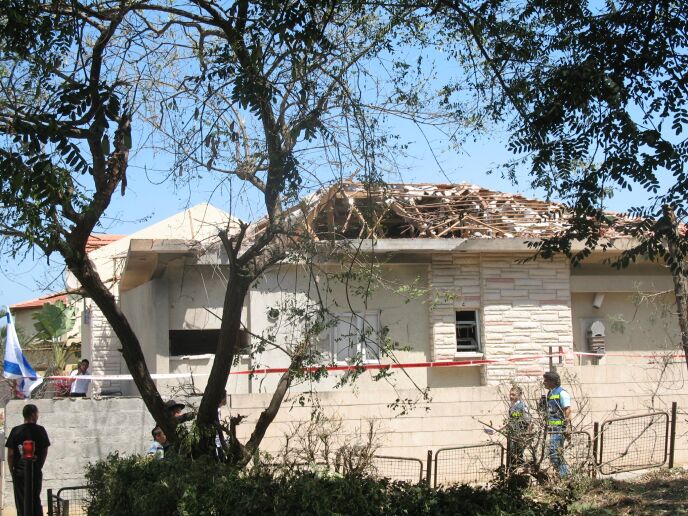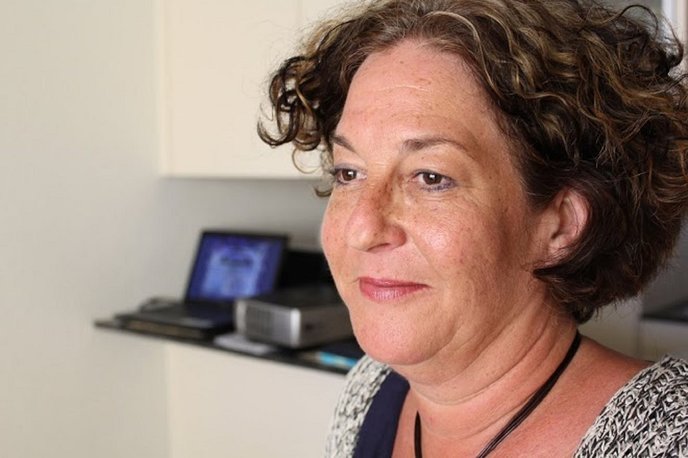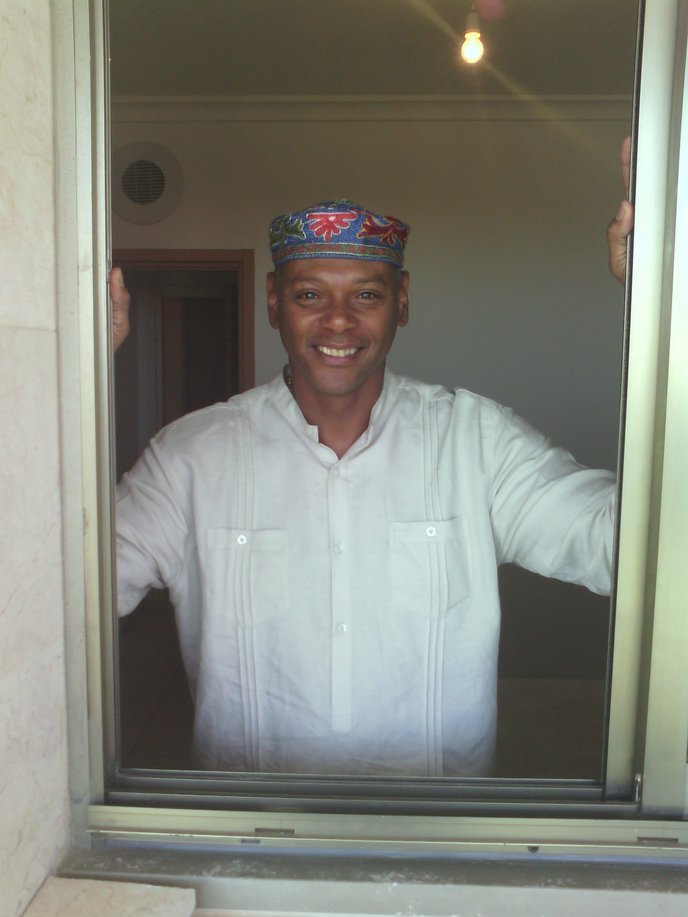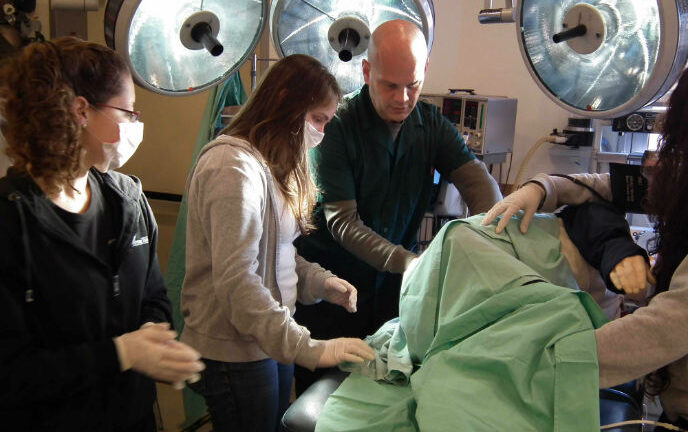During the summer of 2014, the residents of Ashkelon fought their fears with faith in God, the IDF and Iron Dome, learning a new “normal” under a constant barrage of Hamas missiles.
Orli Avior learned to choose a restaurant for its proximity to a bomb shelter. Andi and Effie Moradian’s children learned to accept that there would be no day camp, trips, swimming or swinging in the playground.
June Narunsky learned to pare her shower down to 12 seconds so she’d still have three seconds to dash to safety in case of a Code Red siren. Khaya Dinsky learned to calm her skittish dogs with natural tranquilizer drops in their kibble.
“One never gets used to the sirens because it’s just not normal,” resident Myriam Baharav told ISRAEL21c on the morning of the August 27 ceasefire.
“But for every Ashkelonian I know, it’s become part of the deal, which in itself is not normal. It’s very surreal, this abnormality we live with,” she continues. “There’s a lot of strong faith in this city, even among those who aren’t religious. I think that is what has kept a lot of people going.”
‘This is not our first conflict’
The ancient Mediterranean port city of Ashkelon lies 13 kilometers (eight miles) north of the Gaza Strip. In summer 2014, 277 of the 4,564 projectiles launched from Gaza were bound for Ashkelon, putting the city of about 118,000 residents in the crosshairs more than any other city in Israel. Whereas Gaza border municipalities such as Sderot have been under rocket fire for the past 14 years, Hamas missiles first reached Ashkelon in 2009 and 2012.
“This is not our first conflict,” says Moradian, who grew up in Ashkelon and has children aged 12, 10 and seven. “When our kids were smaller and just been potty trained, they relapsed and wet the bed when there were attacks. Now they don’t wet their beds, but they want to sleep in our bed.”
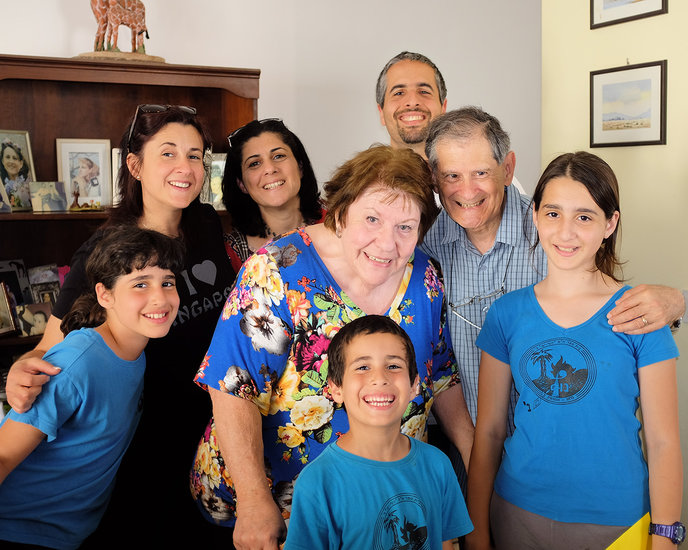
Like many Ashkelon families, the Moradians don’t have a reinforced “safe room,” so they run to the staircase for protection, he tells ISRAEL21c. “If her little brother is sleeping, my older daughter picks him up and takes him there, without waiting for us. I’m sorry that children have to endure something like that, but I admire their strength.”
Seven-year-old Aviv Yehye – who was five months old when Ashkelon was hit with its first Kassam – knows that her bedroom is the reinforced safe room in her family’s apartment, and waited there for Mommy and Daddy when the sirens went off.
Jayme Yehye, married to a native Ashkelonian, is in her third trimester of pregnancy and couldn’t take Aviv on the trips to water parks and other respite activities that the municipality sponsored throughout Operation Protective Edge.
“Aviv and I were mostly stuck at home, so we did activities like spa day and movie day,” says Yehye. “When we did have to go out for grocery shopping or doctor appointments, it was a lot more scary this time because it wasn’t just one daughter I had to worry about but the one inside me, too. Once when we had to get onto the ground during an attack, Aviv asked how I will be able to protect both of them when the baby is born.”
US Army vet in Ashkelon
At 6:30 on the morning of August 26, the Cohen family house in Ashkelon took a direct hit. The parents had gotten up just seconds before, and miraculously got their two children to safety before the roof collapsed. The force of the blast shattered windows of the apartment buildings next door and across the street. All told, 79 residents – including many children – were treated at the local Barzilai University Medical Center for injuries or shock.
A few blocks away, Orli and Ariel Avior ran to their safe room when the siren woke them. They tried to go back to sleep afterward, only the phone kept ringing. So Orli got dressed and went to see the damage.
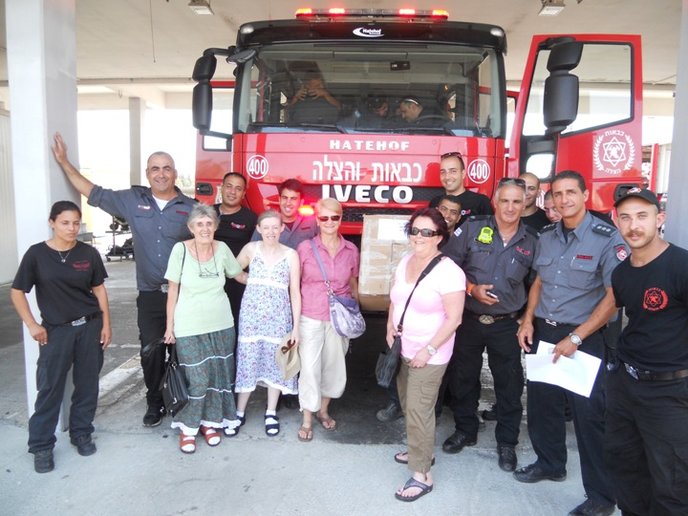
A three-year resident of Ashkelon, Orli Avior isn’t easily rattled. She and her husband moved to Israel from Pennsylvania in 2005 and settled in seaside Netanya north of Tel Aviv. But despite its nearness to Gaza, Ashkelon was less expensive and offered a warm, welcoming social group, ESOA (English Speakers of Ashkelon).
“Gaza didn’t bother me,” she tells ISRAEL21c. “I spent 37 years in the US army as a sergeant major. They even called me out of Israel to go to Afghanistan in 2008.”
When the pediatric clinic in a house around the corner got hit on July 17, Avior went and interviewed the daughter of the doctor, Betty Suissa, and wrote it up for the Winnipeg Jewish Review.
“It’s easier to be in a war than to watch it on TV, when you know our soldiers are doing the best they can and the government is trying to protect us,” says Avior. “The siren goes off and you’ve got to turn the stove off, or you’re out someplace and have to run for shelter, but we assume Iron Dome will get it. We know Iron Dome isn’t perfect and sometimes when it does intercept a missile, [shrapnel] still falls out of the air. So that keeps us going into our safe room.”
The morning the Cohen house was destroyed not far from her home, Yocheved Belogorodsky was enjoying a visit from her former foster daughter Sarah, a 29-year-old with Down syndrome who now lives in a group home in Jerusalem. Sarah hadn’t been to Ashkelon for two months, but was allowed to come when a ceasefire was declared.
“She understood there was a war,” says Belogorodsky. “And when we woke up to a loud boom she called out to me and we went to the safe room together.”
The summer was hard on Belogorodsky financially, because she must drive to Central Israel for work. “I have arthritis in my hip, so getting in and out of my car was the biggest challenge. One day I tried to go to work and three times before I got from my house to outside the city limits, the sirens went off and I had 15 seconds to get to a safe place. It takes me almost that long to get out of my car. So I stayed home and lost income.”
Still, the four-year resident of Ashkelon has no plans to leave. Her neighbors and friends from ESOA kept in constant touch and reinforced her feeling that this is home.
Welcoming new immigrants
ESOA’s monthly coffees had to be cancelled during Operation Protective Edge. The group’s core committee of 14 found many ways to help fellow residents.
“We started the group in 2008,” says June Narunsky, ESOA’s chairwoman. “This is the third war we’ve gone through as a group. On the third day we sent out a Facebook message about making care packages for soldiers, and soon my house looked like a warehouse. Friends and family overseas started sending money — and still are — to help us purchase items for soldiers.”
During the 50 days of the war, ESOA volunteers brought food to soldiers and firefighters, and took home dirty laundry of soldiers they’d just met. They visited soldiers in hospitals and offered home hospitality for Shabbat. They tended to elderly people afraid to go out grocery shopping. They collected goodies for kids in Ashkelon’s 100 underground shelters, and did arts and crafts with them. They helped a Ra’anana volunteer group distribute gift boxes to kids in disadvantaged Ashkelon neighborhood bomb shelters.
“If you’re busy all the time, everything doesn’t seem as bad,” says Narunsky. “We just carried on our normal activities. The only stressful thing is when you go out you need to be in a safe place in case of incoming rockets.”
This week, Narunsky is hosting a welcoming event for several new arrivals and potential immigrants.
Despite being in rocket range of Gaza, Ashkelon has gained a reputation as a less expensive alternative to other shore cities, offering modern culture and conveniences, an ethnically diverse population, easy driving distance to central Israel and a rich heritage dating to biblical times.
“We have investors from the US coming at the end of September to buy real estate,” says Baharav, who works in international client services for the local El Haneches-Ofir Group realty. “During the war we had a couple and two single women who chose to emigrate here from America. I was amazed.”
‘We fear no evil’
The couple is Malahki and Tanya Yehuda from New York. Malahki Yehuda explains to ISRAEL21c that he fell in love with Israel on a work-related trip in 2005, and brought Tanya in 2007. They converted to Judaism four years ago and landed in their new homeland on July 21.
A pilot trip last February had sold them on the South. Beersheva and Ashkelon stood out for convenience and affordability to the two educators in their 50s. The personal warmth and the Mediterranean beach lured them to Ashkelon.
ESOA members encouraged the Yehudas to buy a house with a safe room. They did, not expecting to have to use it as soon as they moved in.
“It has not been easy,” he admits. “Once a rocket went over our heads while we were buying falafel and we had to scurry to safety from shrapnel falling, and another time we had to run off a bus into a police station. On our anniversary last week, sirens went off twice while we were out celebrating.”
Nevertheless, Yehuda continues, “We wouldn’t trade Israel or Ashkelon for the world. The people are so resilient; they inspire us. Though we walk through the valley of the shadow of death, we fear no evil,” he says, paraphrasing Psalm 23.
Trying to stay calm
Narunsky tells ISRAEL21c that she and her husband, Mel, moved to Ashkelon in 1987 and live five minutes from their daughter, Andi Moradian, and her family.
“Our grandchildren would have come over on their own often to visit during the summer break, but we didn’t allow that this summer because you never know when there will be a siren. I missed them very much; we had to see them in the evenings,” Narunsky says.
Effie Moradian says he and Andi did their best to help the kids deal with their fears, especially the loud booms of rockets being intercepted or falling right in their neighborhood.
“It’s hard for them. There is war around them and they are nervous because they know they are risking their lives,” says Moradian, who doesn’t fully trust that the ceasefire will last. “We try to be calm and tell them the truth: that they need to be careful and take shelter whenever they can.”
Not only children are nervous. Khaya Dinsky, an Ashkelon schoolteacher, tells ISRAEL21c her dogs were so on edge during the war that she regularly added drops of Rescue Remedy, a calming flower extract, to their food – and sometimes took it herself. Her house has no safe room. She and her family, and the pets, scurry to a corner by the wall when a Code Red sounds.
“On two separate occasions, one of my dogs came and barked at us before she ran to the corner,” says Dinsky. “She wanted to make sure we followed her to safety.”
As Jayme Yehye waits for her baby to be born, she hopes that Aviv will go back to school with no worries of bombs falling. If they do, the second-grader will know what to do. “For Aviv, this has been her whole life, so she’s unfortunately somewhat used to it,” says her mother.
Baharav adds this report on September 1: “Today we woke up to balloons all over the city for the first day back in school. It was such a nice touch by the city, and brought a lot of smiles onto people’s faces. It’s the small things that make a difference.”




